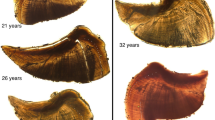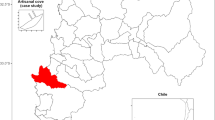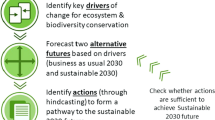Abstract
Recreational fishermen derive utility from catch and fishing effort. Building our analysis on the Gordon-Clark model for renewable resources, we show that a lower importance of catch may result in higher catches. While this effect also holds under first-best management, it may destabilize open-access recreational fisheries to the point of stock collapse. Technical progress in recreational fisheries may mask such dynamics as it enables unaltered angler behavior and constant catches during stock declines.


Similar content being viewed by others
Notes
This may hold for some commercial fishermen as well (Anderson 1980).
Excluding the case \(\theta >0\) shortens Propositions 1 and 2, but no result in this paper depends on the assumption \(\theta \le 0\).
The result that the curvature properties in the Cobb-Douglas case depend on an additional parameter as compared to the general CES case are analogous to the case of a non-renewable resource being essential or inessential for constant consumption (Dasgupta and Heal 1979).
References
Anderson LG (1980) Necessary components of economic surplus in fisheries economics. Can J Fish Aquat Sci 37(5):858–870
Anderson LG (1983) The demand curve for recreational fishing with an application to stock enhancement. Land Econ 59(3):279–286
Anderson LG (1993) Toward a complete economic theory of the utilization and management of recreational fisheries. J Environ Econ Manag 24(3):272–295
Arlinghaus R (2006) On the apparently striking disconnect between motivation and satisfaction in recreational fishing: the case of catch orientation of German Anglers. North Am J Fish Manag 26(3):592–605
Beard TD, Cox SP, Carpenter SR (2003) Impacts of daily bag limit reductions on angler effort in Wisconsin walleye lakes. North Am J Fish Manag 23(4):1283–1293
Bishop RC, Samples KC (1980) Sport and commercial fishing conflicts: a theoretical analysis. J Environ Econ Manag 7(3):220–233
Carpenter SR, Cottingham KL (1997) Resilience and restoration of lakes. Conserv Ecol 1(1)
Carpenter SR, Munoz-Del-Rio A, Newman S, Rasmussen PW, Johnson BM (1994) Interactions of anglers and Walleyes in Escanaba Lake, Wisconsin. Ecol. Appl. 4(4):822–832
Clark CW (1990) Mathematical bioeconomics: the optimal management of renewable resources, 2nd edn. Wiley, New York
Coleman FC, Figueira WF, Ueland JS, Crowder LB (2004) The impact of United States recreational fisheries on marine fish populations. Science 305(5692):1958–1960
Cooke SJ, Cowx IG (2006) Contrasting recreational and commercial fishing: searching for common issues to promote unified conservation of fisheries resources and aquatic environments. Biol Conserv 128(1):93–108
Cox SP, Beard TD, Walters CJ (2002) Harvest control in open-access sport fisheries: hot rod or asleep at the wheel? Bull Mar Sci 70:749–761
Dasgupta P, Heal G (1979) Economic theory and exhaustible resources. Cambridge University Press, Cambridge
Dasgupta P, Mäler KG (eds) (2003) The economics of non-convex ecosystems. Kluwer Academic Publishers, Dordrecht
Fedler AJ, Ditton RB (1986) A framework for understanding the consumptive orientation of recreational fishermen. Environ Manag 10:221–227
Fedler AJ, Ditton RB (1994) Understanding angler motivations in fisheries management. Fisheries 19(4):6–13
Fenichel EP, Abbott JK, Huang B (2012) Modelling angler behaviour as a part of the management system: synthesizing a multi-disciplinary literature. Fish Fish.
Gordon H (1954) The economic theory of a common-property resource: the fishery. J Polit Econ 62:124–142
Harley SJ, Myers RA, Dunn A (2001) Is catch-per-unit-effort proportional to abundance? Can J Fish Aquat Sci 58(9):1760–1772
Holling C (1959a) Some characteristics of simple types of predation and parasitism. The Can Entomol 91(7):385–398
Holling C (1959b) The components of predation as revealed by a study of small-mammal predation of the European pine sawfly. Can Entomol 91(5):293–320
Ihde TF, Wilberg MJ, Loewensteiner DA, Secor DH, Miller TJ (2011) The increasing importance of marine recreational fishing in the us: challenges for management. Fish Res 108(2–3):268–276
Johnson BM, Carpenter SR (1994) Functional and numerical responses: a framework for fish-angler interactions? Ecol Appl 4(4):808–821
Lewin W-C, Arlinghaus R, Mehner T (2006) Documented and potential biological impacts of recreational fishing: insights for management and conservation. Rev Fish Sci 14(4):305–367
McConnell KE, Sutinen JG (1979) Bioeconomic models of marine recreational fishing. J Environ Econ Manag 6(2):127–139
NMFS (2010) Fisheries economics of the United States, 2009. National Marine Fisheries Service
NMFS (2011) Fisheries of the United States (2010) National Marine Fisheries Service (NMFS). Office of Science and Technology, Fisheries Statistics Division
Nussman M (2005) The recreational Fisher’s perspective. Science 307(5715):1560–1561
Post JR, Sullivan M, Cox S, Lester NP, Walters CJ, Parkinson EA, Paul AJ, Jackson L, Shuter BJ (2002) Canada’s recreational fisheries: the invisible collapse? Fisheries 27(1):6–17
Post JR, Mushens C, Paul A, Sullivan M (2003) Assessment of alternative harvest regulations for sustaining recreational fisheries: model development and application to Bull Trout. North Am J Fish Manag 23:22–34
Post JR, Persson L, Parkinson EA, van Kooten T (2008) Angler numerical response across landscapes and the collapse of freshwater fisheries. Ecol Appl 18:1038–1049
Schuhmann PW, Easley JJ (2000) Modeling recreational catch and dynamic stock adjustments: an application to commercial-recreational allocation. Land Econ 76(3):430–447
Milliman SR, Johnson BL, Bishop RC, Boyle KJ (1992) The bioeconomics of resource rehabilitation: a commercial-sport analysis for a Great Lakes fishery. Land Econ 68(2):191–210
Walters CJ, Cox S (1999) Maintaining quality in recreational fisheries: how success breeds failure in the management of open-access sport fisheries. Fish Centre Res Rep 7(2):22–29
Walters CJ, Martell SJ (2004) Fisheries ecology and management. Princeton University Press, Princeton
Author information
Authors and Affiliations
Corresponding author
Rights and permissions
About this article
Cite this article
Stoeven, M.T. Enjoying Catch and Fishing Effort: The Effort Effect in Recreational Fisheries. Environ Resource Econ 57, 393–404 (2014). https://doi.org/10.1007/s10640-013-9685-4
Accepted:
Published:
Issue Date:
DOI: https://doi.org/10.1007/s10640-013-9685-4




